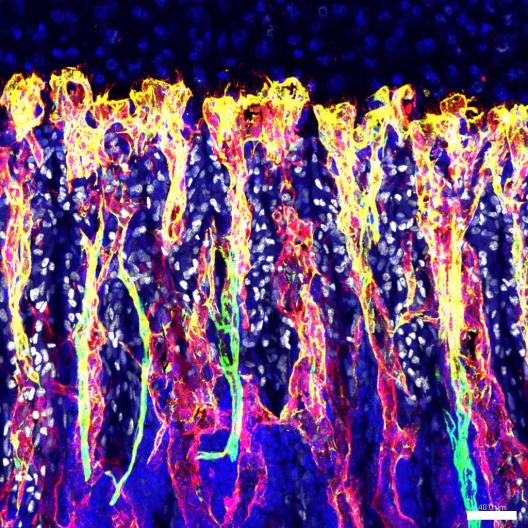Prof. Dr. Ralf H. Adams
Functional specialization of blood vessels
and vascular stem cell niches

Vascular Biology/Angiogenesis
Cell Biology/Molecular Biology
Stem Cell Biology
In the vertebrate body, endothelial cells and supporting mesenchymal cells, namely pericytes and vascular smooth muscle cells, form a complex and adaptable network that is essential for the circulation of gases, nutrients, waste products, signaling molecules, and blood cells. In addition to this traditional transport role, there is increasing evidence that endothelial cells can control tissue growth, homeostasis and regeneration through the release of growth factors or by controlling the metabolic properties of the surrounding tissue. In the skeletal system, for example, blood vessels provide specialized niche microenvironments for mesenchymal and hematopoietic stem cells, which are essential for bone formation, the self-renewal of stem cells and the lifelong production of blood cells. We use state-of-the-art mouse genetics, immunohistochemistry, confocal and two-photon microscopy, cell/organoid culture, single-cell RNA sequencing, bioinformatics, and molecular biology methods to study the pathways controlling endothelial cell behavior, artery formation, the organ-specific and functional specialization of blood vessels, and the crosstalk of endothelial cells and pericytes with the surrounding tissue and stem cells.

Vita
- 1987-1992 Studies in Biochemistry, University of Bayreuth
- 1996 Graduation Dr. phil.nat., MPI for Brain Research & University of Frankfurt
- 1996-2000 Postdoc with Dr. Rüdiger Klein, EMBL Heidelberg
- 2000-2005 Group Leader at the Cancer Research UK London Research Institute, London
- 2000 Werner Risau Memorial Award
- 2000-2003 EMBO Young Investigator Programme
- 2005-2008 Senior Group Leader at the London Research Institute
- Since 2007 Director department "Tissue Morphogenesis" at the Max Planck Institute for Molecular Biomedicine in Münster; Professor at the University of Münster
- 2014 Elected EMBO Member
- 2017 Malpighi Award, European Society for Microcirculation
- 2021 Feldberg Prize, Feldberg Foundation for Anglo-German Scientific Exchange
Selected references
Koh BI, Mohanakrishnan V, Jeong HW, Park H, Kruse K, Choi YJ, Nieminen-Kelhä M, Kumar R, Pereira RS, Adams S, Lee HJ, Bixel MG, Vajkoczy P, Krause DS, Adams RH (2024). Adult skull bone marrow is an expanding and resilient haematopoietic reservoir. Nature 636:172-181.
Mohanakrishnan V, Sivaraj KK, Jeong HW, Bovay E, Dharmalingam B, Bixel MG, Dinh VV, Petkova M, Paredes Ugarte I, Kuo YT, Gurusamy M, Raftrey B, Chu NTL, Das S, Rios Coronado PE, Stehling M, Sävendahl L, Chagin AS, Mäkinen T, Red-Horse K, Adams RH (2024). Specialized post-arterial capillaries facilitate adult bone remodelling. Nat Cell Biol 26:2020-2034.
Liu Y., Chen Q., Jeong H.W., Koh B.I., Watson E.C., Xu C., Stehling M., Zhou B., Adams R.H. (2022). A specialized bone marrow microenvironment for fetal haematopoiesis. Nat Commun 13:1327.
Chen Q., Liu Y., Jeong H.W., Stehling M., Dinh V.V., Zhou B., Adams R.H. (2019). Apelin+ Endothelial Niche Cells Control Hematopoiesis and Mediate Vascular Regeneration after Myeloablative Injury.
Cell Stem Cell 25:768-783.e6.
Pitulescu M.E., Schmidt I., Giaimo B.D., Antoine T., Berkenfeld F., Ferrante F., Park H., Ehling M., Biljes D., Rocha S.F., Langen U.H., Stehling M., Nagasawa T., Ferrara N., Borggrefe T., Adams R.H. (2017).
Dll4 and Notch signalling couples sprouting angiogenesis and artery formation.
Nat Cell Biol. 19:915-927.
Links
